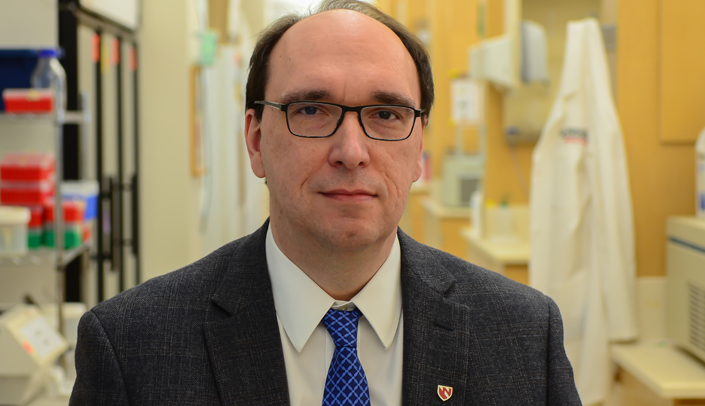When it comes to cancer, it isn’t the primary tumor that gets you, but the metastasis.
“We need to do something about metastasis, because that’s why people die,” said David Oupicky, Ph.D., professor of pharmaceutical sciences and co-director of the Center for Drug Delivery and Nanomedicine.
And yet, Dr. Oupicky lamented, only about 5 percent of all the money raised for breast cancer, for example, goes toward fighting metastasis.
Thankfully, through his research, Dr. Oupicky and his team have found very encouraging preliminary evidence that suggests certain nanoparticles can be properly targeted to block the cell signals that cause cancer metastasis.
That would be a breakthrough in cancer care.
That’s the first part of the story.
The second part is making that happen, through a spinoff company.
As any researcher can tell you, it often takes decades, if at all, for potential scientific advances to see the light of day. Dr. Oupicky hopes to accelerate the process.
Dr. Oupicky and collaborators have formed Bohemica Pharmaceuticals, LLC.
“Universities are really great at thinking of great ideas, researching those ideas,” said Nisha Avery, a business innovation consultant at the Nebraska Department of Economic Development. But sometimes, in terms of money, momentum and in concentrating on just one thing, a discovery has a better chance of moving forward if it’s bought and sold.
Without an added push to turn that promising research into a reality, a great idea might just stay that — a great idea.
Dr. Oupicky and his team — and Bohemica — have partnered with the Nebraska Department of Economic Development.
After securing $346,000 in National Institutes of Health (NIH) Small Business Technology Transfer (STTR) funding from the National Center for Advancing Translational Sciences, Bohemica also was awarded $100,000 in matching funds from the state.
Dr. Oupicky hopes more UNMC faculty become aware of, and take advantage of, such opportunities. Avery said much of this state funding goes unclaimed each year. Meanwhile, Dr. Oupicky and team continue to collaborate on translational research on cholangiocarcinoma (bile duct cancer) with Justin Mott, M.D., Ph.D., associate professor of biochemistry and molecular biology.
As they gather more proof of principle and toxicology data, they can move toward Investigational New Drug status, and hopefully, early clinical trials.
“We’re too early for a big pharma to come in,” Dr. Oupicky said. “But with a little more validation and de-risking, companies will be more interested in licensing our technology.”
